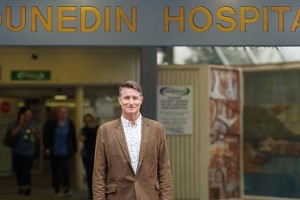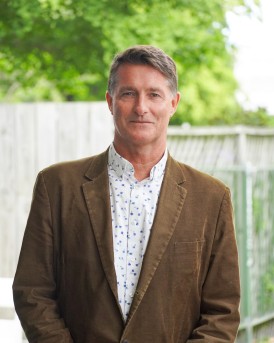
INTERVIEW: Study to create action plan for spiritual care in Aotearoa.
HPF recently caught up with Otago University’s Associate Professor, and member of HPF’s Academic Reference Group,  Richard Egan for a written interview about a research study which he is co-leading to create a national action plan for spiritual care in the health system.
Richard Egan for a written interview about a research study which he is co-leading to create a national action plan for spiritual care in the health system.
Richard and co-lead Associate Professor Waikaremoana Waitoki from Te Pua Wānanga ki te Ao, Waikato University, received almost $1.4 million for their project, believed to be a first in NZ, in the Health Research Council’s December 2024 funding round.
We asked Richard to tell us more about this innovative study, what it entails and how long it will take.
‘While research has been conducted in various areas, such as spirituality and end-of-life care, as well as nursing, this study will be the first to map the provision of spiritual care in healthcare nationwide,’ explained Richard.
INTERVIEW:
Q: You’ve been working in the field of spirituality and healthcare for some 25 years now. During this time how significant has the growth in evidence been showing the link between spirituality and health and wellbeing?
A: The field of spirituality and healthcare research is relatively new but has seen significant growth over time. Currently, there are over 70,000 peer-reviewed publications that explore various aspects of this field. While more research is needed, particularly in terms of more advanced designs, the overall direction of the research supports the effectiveness of spiritual care.
Q: Is this the first time a study, of this magnitude, in this field, has been done in Aotearoa NZ?
 A: Our research, funded by the Health Research Council, aims to explore how to achieve excellence in spiritual care across our healthcare systems at the policy, institutional, and practice levels. We acknowledge the valuable work being carried out by chaplains and other spiritual care experts, both Māori and non-Māori. While research has been conducted in various areas, such as spirituality and end-of-life care, as well as nursing, this study will be the first to map the provision of spiritual care in healthcare nationwide. Additionally, we will be seeking input from all interested parties to determine their aspirations for the future. Notably, our research is being led by both Māori and non-Māori, and we have assembled a significant team of Māori researchers. Furthermore, we have established connections with various ethnic, religious, and humanist groups throughout Aotearoa. (Photo by Amaury Gutierrez on Unsplash)
A: Our research, funded by the Health Research Council, aims to explore how to achieve excellence in spiritual care across our healthcare systems at the policy, institutional, and practice levels. We acknowledge the valuable work being carried out by chaplains and other spiritual care experts, both Māori and non-Māori. While research has been conducted in various areas, such as spirituality and end-of-life care, as well as nursing, this study will be the first to map the provision of spiritual care in healthcare nationwide. Additionally, we will be seeking input from all interested parties to determine their aspirations for the future. Notably, our research is being led by both Māori and non-Māori, and we have assembled a significant team of Māori researchers. Furthermore, we have established connections with various ethnic, religious, and humanist groups throughout Aotearoa. (Photo by Amaury Gutierrez on Unsplash)
Q: Can you please tell us about the main aims of the study, what it entails and how long it will take?
A: We have four objectives: : 1) to understand existing spiritual care needs in Aotearoa New Zealand; 2) to understand ANZ spiritual care practitioners’ existing spiritual care provision; 3) to investigate how spiritual care might be best provided to Aotearoa New Zealand’s diverse population within the framework of Te Tiriti o Waitangi; and 4) to develop consensus-based spiritual care recommendations and an action plan for Aotearoa New Zealand healthcare. We will proceed in three phases.
First, we will aim to engage with all interested parties, including Māori communities, through 10 face-to-face hui held across the country, as well as 10 virtual hui. In the second phase, we will conduct three quantitative studies (surveys) and three qualitative studies (systematic collection of stories through hui, interviews, and focus groups) involving the general population, partners and stakeholders, providers, and management. The project is three years long, during which we will co-design recommendations and an action plan for the future of spiritual care in Aotearoa.
Q: What sort of health promotion view will the study take?
A: Arguably, spirituality is both a dimension and determinant of health. Although health promotion models acknowledge the importance of spirituality, we often struggle to explicitly incorporate it into needs assessments, interventions, and evaluations. This project aims to deeply explore spirituality , from its impact at the bedside to its influence on training and institutional priorities, as well as its connection to the policy environment. While our primary focus is not explicitly on health promotion, this national study has the potential to shift our perspective on the role of spirituality in healthcare.
Q: How much of a focus on Māori, for whom wairua or spirituality is considered essential for health, will the study have?
A: As you mentioned, Prof/Sir Durie stated that wairua is considered "the most essential requirement for health". While Māori concepts of wairua include spirituality (as it is understood post-contact), the depth of knowledge related to wairua is not well incorporated into hospital systems. We are supported by Associate Professor Natasha Tassell-Matamua, who co-designed the project. Natasha has since passed the co-lead role to Waikaremoana. One of our team members, Dr Hukarere Valentine, is a world expert on wairuatanga, particularly psycho-oncology and by extension, hospital care.
As a Pakeha, I don't personally discuss wairua, but instead, follow the lead of Māori experts, not only in the team, but also the connections I have made over the years. Waikaremoana and the Māori rōpū will prioritise Māori needs and aspirations which will also include foundational understandings of Te Tiriti o Waitangi and mātauranga Māori in hospital care.
Q: How can health promoters contribute to this study?
A: I hope that the health promotion community will get involved in this project, both by contributing their own wisdom and thoughts, and by empowering the communities they work with to add their voices.